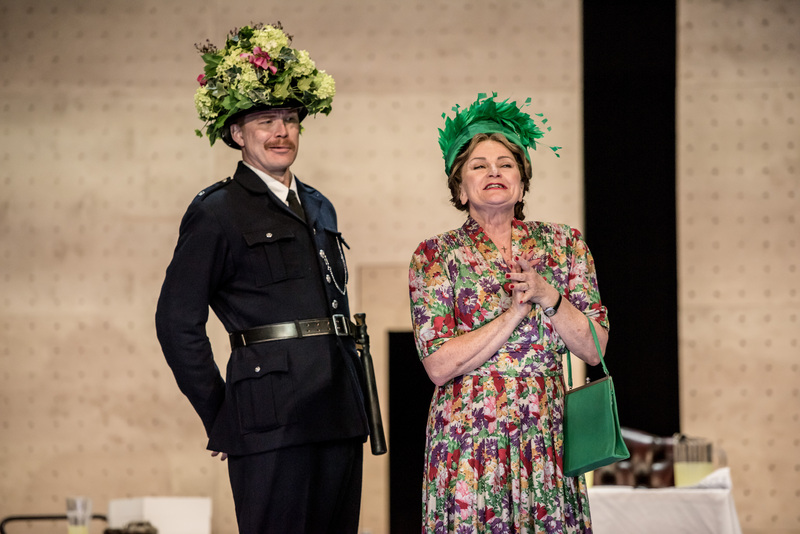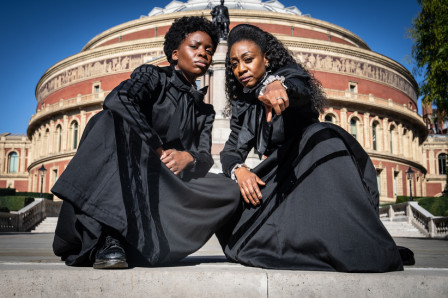Review: ALBERT HERRING at London Coliseum
Under the tagline From Boy, To King, To Man, ENO’s semi-staged production of Benjamin Britten’s comic opera ALBERT HERRING offers Londoners an opportunity to delve into yesteryear and specifically the quaint provincial trivialities of life at Loxford amidst rural East Anglia, where apparently every young maiden is of easy virtue!
 Andri Björn Róbertsson, Leah-Marian Jones, ENO’s Albert Herring 2025 © Genevieve Girling
Andri Björn Róbertsson, Leah-Marian Jones, ENO’s Albert Herring 2025 © Genevieve Girling
Local dignitary Lady Billows (played by the Wagnerian powerhouse Emma Bell) has her shoes buffed and newspaper ironed by a trusty orderly, commensurate with her role as the dominant force behind the local parish council committee. Striding around with a swagger stick and bedecked in military khaki, she is determined to find a worthy and morally upstanding young woman to be crowned this year's Queen of the May. Unfortunately, her trusted assistant Florence (a gently comic turn from Carolyn Dobbin) keeps an ear to the ground about such matters and believes every young woman nominated by Lady Billow's bureaucratic lieutenants is wanting in some regard — usually as a result of engaging in improper or even immoral behaviour. The candidates are variously described as wantons, slatterns and whores for having committed the very slightest of indiscretions. As the list of eligible young women whose portraits adorn the noticeboard diminishes, — their images are crossed off with a red marker pen, a jovial nod to exiled and murdered contestants on television's The Traitors.
Eventually, the pompous and stuffy committee composed of Mr Upfold (Mark Le Brocq), Miss Wordsworth (Aoife Miskelly), Mr Gedge (Eddie Wade) and Superintendent Budd (Andri Björn Róbertsson) lands on a novel way in which to shame local young women into propriety, whilst still securing a figurehead for the imminent May Day celebrations. They'll crown a mild-mannered and hard-working shopkeeper who still lives with his mother and who never has time for himself, never mind lascivious shenanigans. Albert Herring (Caspar Singh) will be their King of the May. To sweeten the deal, there will be a prize of twenty-five gold sovereigns and an awards lunch with speeches at which Florence leads the parade with a ceremonial broadsword held mockingly aloft akin to Penny Mordant's turn at King Charles' coronation.
Albert's mother (Leah-Marian Jones) is in raptures. However, two mischievous friends, Sid (Dan D'Souza) and his latest girlfriend Nancy (Anna Elizabeth Cooper), see it as an opportunity to loosen Albert's stays by spiking his lemonade with rum. When an intoxicated Albert goes gadabout and everyone believes he has either thrown himself in the village pond or absconded from their backwater to spend his prize money on high living, there is much hand-wringing, but this is essentially a comedy of morals and manners, so all comes good in the end.
As directed and designed by Antony McDonald the production leans heavily into Britten's music relying on an almost flat-packed set which eschews any hint of a maypole. In a slightly abstract manner, the stage manager sits visible downstage right throughout proceedings and calls the show, contributing clocks, bells, and other effects while rallying his team of gallant stage hands. Meanwhile, in the pit, Daniel Cohen conducts the orchestra with precision, particularly noticeable during the extremely light but demanding entr'acte with its held string and woodwind notes.
The opera runs 2 hours 45 minutes with an interval, and after its final London performance, is set to move to the Lowry in Salford.
Latest News

 SYLVIA Releases First Single, 'March Women March'
4 March 2026 at 17:04
SYLVIA Releases First Single, 'March Women March'
4 March 2026 at 17:04

 Full cast and creative team announced for World Premiere of PLEASE PLEASE ME
4 March 2026 at 16:18
Full cast and creative team announced for World Premiere of PLEASE PLEASE ME
4 March 2026 at 16:18

 Rehearsal Images Released for JAJA'S AFRICAN HAIR BRAIDING at Lyric Hammersmith Theatre
4 March 2026 at 15:05
Rehearsal Images Released for JAJA'S AFRICAN HAIR BRAIDING at Lyric Hammersmith Theatre
4 March 2026 at 15:05

 STICK MAN returns to London for 15th run this festive season
4 March 2026 at 12:06
STICK MAN returns to London for 15th run this festive season
4 March 2026 at 12:06
